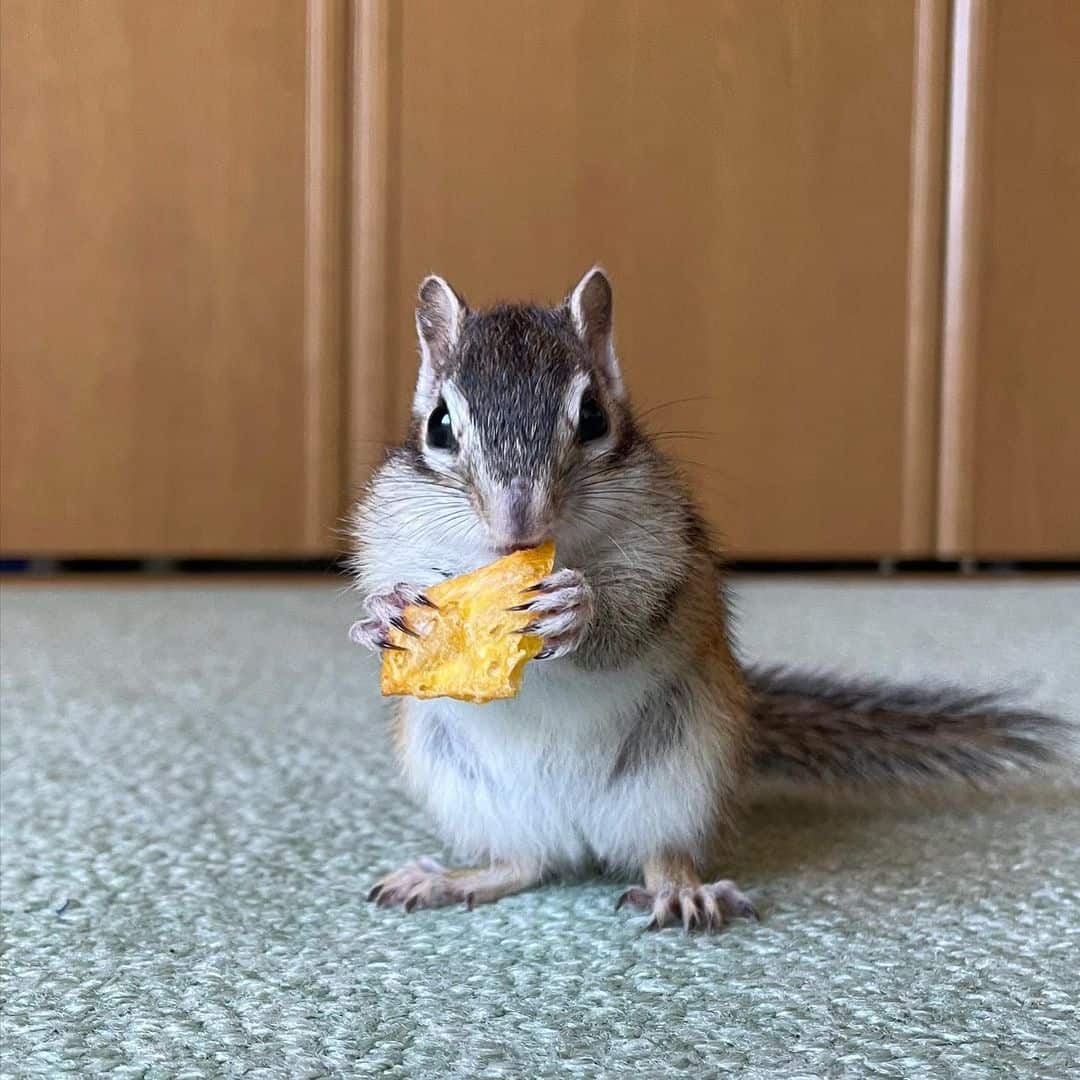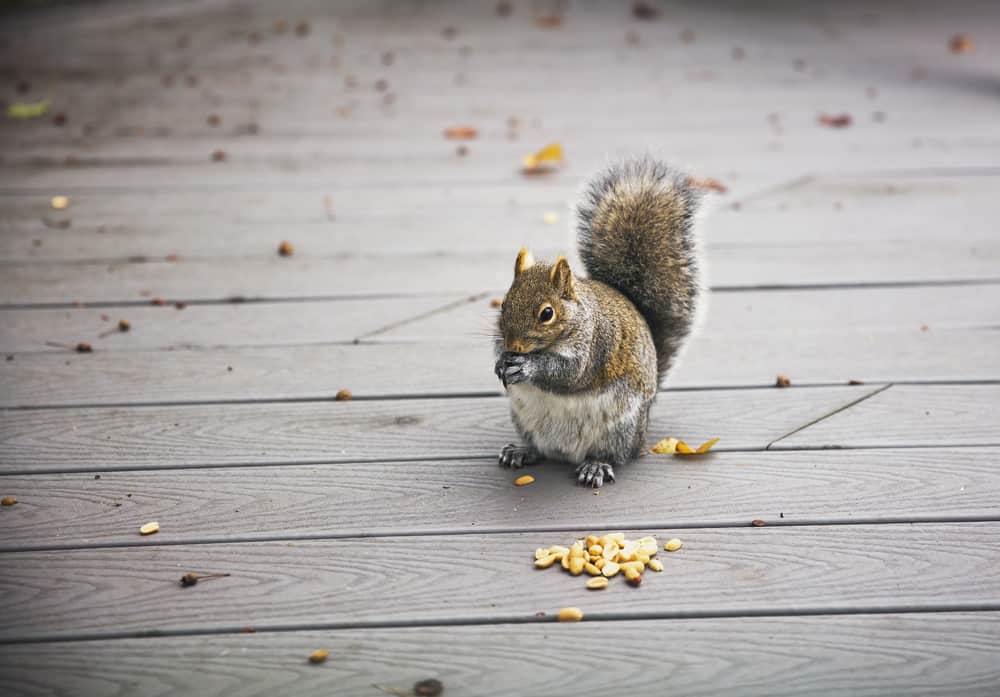If you have a chipmunk problem but are not really sure if you should take care of it, thinking to yourself, “Well, what is the worst these cute tiny critters can do?” let’s give you a couple of ideas.
Chipmunks mostly live in underground tunnels called burrows since these places provide excellent shelter from predators.
However, not only can these tunnels disrupt your garden’s soil and therefore lead to less success in growing plants, but they also lead to structural damage if they are located under your home’s foundation, porch, or patio.
The second reason has to do with the overground damage they can cause. Flower bulbs, flowers, fruits, vegetables, seeds, beneficial insects – they will munch on anything.
A large chipmunk infestation can cause quite a mess. So what do you think – is it time to learn how to get rid of chipmunks?
The Best Home Improvement Tips to Prevent Chipmunk Infestations
First things first. Preventing chipmunk invasions requires a proactive approach. If you don’t want to face the problem later, it is better to prepare your house in advance. Here are some home improvement strategies that can help:
- Seal Potential Entry Points: Chipmunks can squeeze through small gaps in doors and windows. Ensuring all potential entry points are sealed is a crucial first step. For instance, patio door replacement experts share that a well-sealed door can make a significant difference in keeping unwanted critters out.
- Landscaping Adjustments: The layout and maintenance of a garden can influence the likelihood of chipmunk infestations. Clear, open spaces and regularly trimmed plants deter chipmunks from making burrows near homes. Removing piles of wood or debris that could serve as hiding spots is also recommended.
- Proper Waste Management: Chipmunks are often attracted to easily accessible food sources. Securing garbage bins and compost piles can help avoid attracting these critters.
- Regular Home Inspections: Routine checks around the home can help identify potential chipmunk infestations early. Homeowners should look for signs of burrowing near the home’s foundation, patio, or porch.
By implementing these preventative measures, homeowners can protect their homes from chipmunks and other pests, maintaining a safe and pleasant living environment.
How To Get Rid Of A Chipmunk That Is Inside Of A House?
Tools
- Patience
- Live trap
- Ultrasonic devices
- Repellent spray
- Mothballs
- Large bucket
- Spray bottle
Materials
- Peanut butter
- Chili powder
- Cayenne
- (Warm) water
- Garlic
- Peppermint
- Lysol
- Epsom salt
Chipmunks are not big fans of our homes, so they rarely wander into them. Still, it is not entirely unheard of for them to find themselves there either by chance or in search of food. That is why it is good to know how to get rid of them without killing them. We will give you two methods on how to achieve this!
1. Let The Chipmunk Leave The House By Itself
This method requires some patience and luck, almost no work, and no money.
Step 1: Locate The Chipmunk
This step might be a little bit challenging, but if you have ever dealt with mice, you know it is doable. Most of the time, you will just wait for it to present itself to you.
Step 2: Place Pets And Small Kids In Another Room
When you finally locate the little pest, if possible, place pets or small children who could scare or even attack the chipmunk in another room.
Step 3: Shut Off All Possible Escape Exits In The Room Where The Chipmunk Is Located
Close window(s) and shut off all cracks, holes, and other similar spots through which the chipmunk could escape the room where it is located to another place in your home.
Step 4: Close the Doors And Windows Of All Rooms Except The Main Room
Close all doors and windows in the house except the entrance door and the door of the room where the chipmunk is located (you can also leave the window of the room where it is located open as it might try to go out through it).
Step 5: Wait Until The Chipmunk Leaves Your House
Wait until the chipmunk leaves your house. It can sometimes take a few hours because they are very fearful animals, but they certainly do not plan to stay inside for a long time and will come out sooner or later.
2. Trap The Chipmunk And Release It Far From Home
If you are not a person with a lot of patience and want to get rid of this gargantuan pest as soon as possible, then you can use a trap and get rid of the chipmunk that way.
Step 1: Buy A Live Trap
Get a live trap between 10 and 20 inches long that is wrapped in wire mesh. When choosing a trap, choose one where the holes on it are small enough so the chipmunk can not get through them.
Step 2: Set The Trap
Place the trap in the place or places (if you buy more than one) where you have seen the chipmunk.
Step 3: Apply Peanut Butter To The Trigger Plate
You might not be surprised to hear that chipmunks are peanut butter connoisseurs, which is why you should spread it all over the trap’s trigger plate to lure them. Sunflower seeds also work.
Step 4: Wait Until The Chipmunk Gets Trapped
Wait until the chipmunk is caught in the trap. Patience is a virtue!
Step 5: Release The Chipmunk Into The Wilderness
Walk or drive a few miles from your house until you find a place to release the cute critter.
They usually live in forests, so it would be nice if their new home were like that. In case you live in an urban area, you can drive to a wooded area and release it there. Alternatively, you can try to find a home for it or gift it to someone.
If you are worried about separating chipmunks from their family, you will be glad to know that they are solitary animals (except during the breeding season).
Extra Tip:
This method applies to chipmunks hiding in your garden, so you can also set the trap outside. Just remember that these tiny animals are not big fans of open spaces, which is why you should place the trap near wood and rock piles, shed, burrows, corners of your garden and fences, etc.
3. Call For Professional Help
If you do not want to deal with any of the two previous methods, you can always give a call to a pest control company and have them get rid of this issue for you.
4. Repelling Chipmunks

In the vast majority of cases, chipmunks will hide and cause problems outside, where it is harder to catch them and notice them. That is why we suggest you try to repel chipmunks and drive them away from your property. Let’s list some of the most popular homemade and commercial repellents!
Homemade Repellents
Homemade or natural repellents are a simple and cheap way to get rid of chipmunks. Although there are many scents and flavors that chipmunks do not like, we will present two that have proven to be the best in this field.
The scent of these deterrents will evaporate in a few days, so it is necessary to apply them several times.
- Homemade Repellent #1
Mix chili powder or cayenne (1 tsp) with warm water (1 cup) in a spray bottle. If you want an even more effective mixture, add crushed garlic (3 to 4 cloves) or chopped-up peppermint (a few leaves).
Sprinkle this repellent on and over the spots where you have noticed chipmunk activity, around their burrows (if you manage to locate them), on the plants that they have raided and munched on, and on the plants that you want to protect.
- Homemade Repellent #2
Another repellent that can be prepared from the stuff that most households have is a mixture of Lysol (1 tsp), Epsom salt (3 tsp), and water (1 gal).
Since you probably do not have a spray bottle that can hold this much liquid, first mix these three components in a big bucket. Then pour some of it into the bottle and sprinkle it around the garden and/or house.
It is important to note that you should not apply this mixture to the plants but around them to avoid damaging them.
Commercial Repellents

There are a lot of commercial repellents on the market, some of which claim to be all-animal, all-rodent, or only for squirrels. We suggest buying rodent or squirrel repellent because you can’t go wrong with that.
But these deterrents are (slightly) more expensive than the DIY versions, so keep that in mind before you buy them.
When it comes to the types of these repellents, you can find them in a few forms and shapes.
- Ultrasonic Repellents
The first are ultrasonic devices that emit a high-pitched sound at a frequency that disturbs the pest and drives it away as far as possible from the sound source. (Do not worry about them doing this to you.)
The only problem with these devices is that they will not cause problems for chipmunks that are located underground.
- Repellent Sprays
The second type is commercial repellent sprays that function the same as homemade repellents, meaning their use is the same.
- Mothballs
Mothballs are excellent pesticides many people use to solve problems with uninvited guests. They are also effective against chipmunks since these small rodents can not stand the chemical naphthalene they contain.
Spread the mothballs all over the garden, but also in places like the basement, attic, and crawl space if you think or know that chipmunks are also hanging inside your home.
Extra tip: Follow the manufacturers’ instructions for any of the commercial products so as to get the most out of them but also not to misuse them.
Make Your Garden Less Inviting For Chipmunks

Making your garden less inviting for chipmunks will deter not only those specimens currently there but also all possible future visitors of this kind. Here are some tips:
- Regularly clean the bird feeder so there are no seeds on the ground for chipmunks to eat. Also, place it at least 15 feet from any building or other structure so chipmunks can not reach it.
- Clean your garden and shed of any nuts, berries, and any other food source that might be lying around for chipmunks to sink their teeth in.
- Trim and regularly maintain your lawn and any other overgrown plants in your garden that chipmunks might use for shelter or as food. You can remove some of the shrubs and flowers altogether if you notice chipmunks taking a particular interest in them.
Conclusion
So, there you have it: you either can practice patience and wait for the chipmunks to leave your home or take the matter into your own hands by trapping and releasing it far from your house (or garden).
To repel them use a wide range of homemade and commercial repellents.
And as always, do not forget that it is better to be safe than sorry – make your garden less inviting for these cute animals, and you probably will not have issues with them in the future.
Another thing to not forget is to ask anything related to this topic in the comments!
